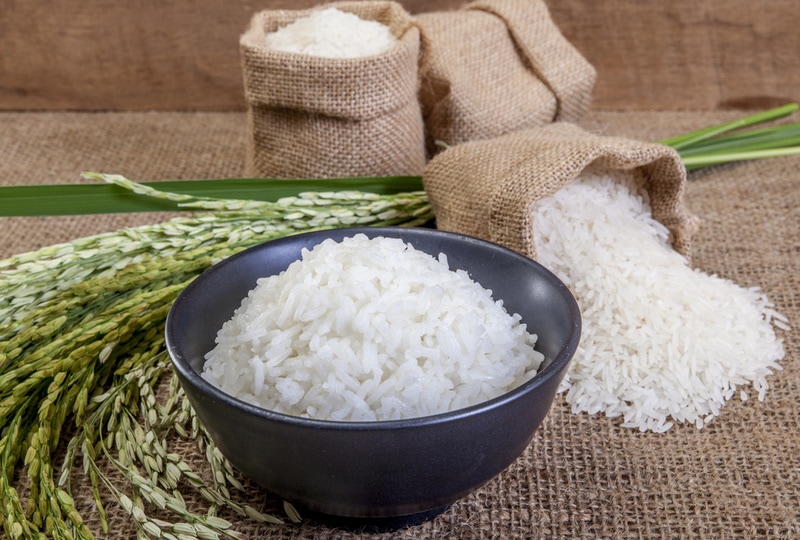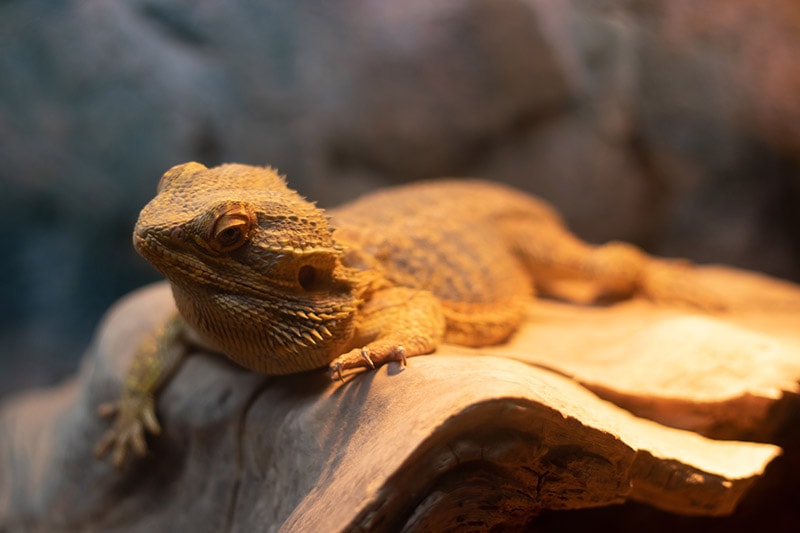What Do Bearded Dragons Eat as Pets? Vet Reviewed Diet
Updated on
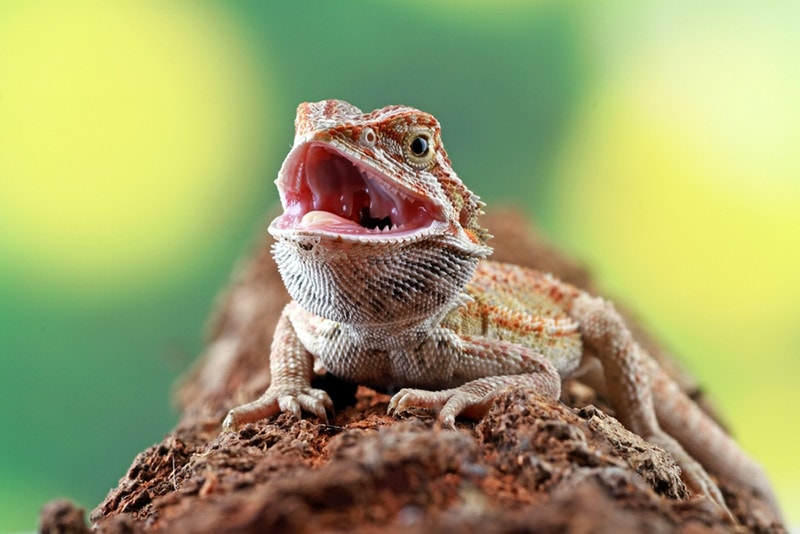
Bearded Dragons are omnivorous, meaning they consume a mixture of animal protein and veggies. In the wild, the exact animals and veggies the Bearded Dragons would consume depends on what they’d be able to find around them, a variety of insects and leafy plants.
However, in captivity, it mostly matters what their owners can find. Therefore, they eat insects commonly available at local pet stores (like crickets and mealworms). They also consume commonly available veggies that the average human consumes, such as collard greens, bell peppers, and carrots.
Commercially available foods are available and are a useful supplement to feeding a varied diet. It is recommended that you speak to a reptile vet about the requirements needed for a healthy Bearded Dragon at each life stage.
Here’s a breakdown of what a Bearded Dragon eats when kept as a pet:
What Bearded Dragons Eat as Pets?
1. Insects
Bearded Dragons must consume various insects (and sometimes slightly larger animals, like baby mice) for protein. Growing Bearded Dragons have higher protein requirements than adult dragons. Other factors may also increase a bearded dragon’s protein needs, like underlying health problems.
- Crickets: Crickets are a frequent staple for bearded dragons. They are simple to find in most pet stores and abundant in protein. Plus, it can be entertaining to encourage Bearded Dragons’ natural habits by having them chase and hunt crickets. (Remove any remaining live insects after the feeding is over).
- Mealworms: Bearded Dragons can also consume mealworms, another common insect. They should be consumed in moderation because they are high in fat. Furthermore, they have a hard outer shell that can be challenging for Bearded Dragons to digest, so it’s better to give them as a treat or in small amounts.
- Waxworms: Although they should be consumed in moderation due to their high-fat content, waxworms can occasionally make for a tasty treat for bearded dragons. They are a fantastic option for younger or less robust Bearded Dragons because they are soft and simple to digest.
- Superworms: Although identical to mealworms in size and protein content, superworms are larger. A Bearded Dragon can benefit from using them occasionally in its diet, but they shouldn’t be its main source of protein.
- Roaches: For Bearded Dragons, roaches provide a nourishing and protein-rich meal. They provide a good staple insect to counteract nutritional deficits because they are low-fat and simple to digest.
It’s crucial to provide your Bearded Dragon with gut-loaded insects or insects that have previously been fed a nourishing diet while feeding insects to your pet. This ensures that the food you provide your Bearded Dragon has the most nutritional value possible. You should also dust the insects with calcium and vitamin D3 powder to prevent nutritional deficits.
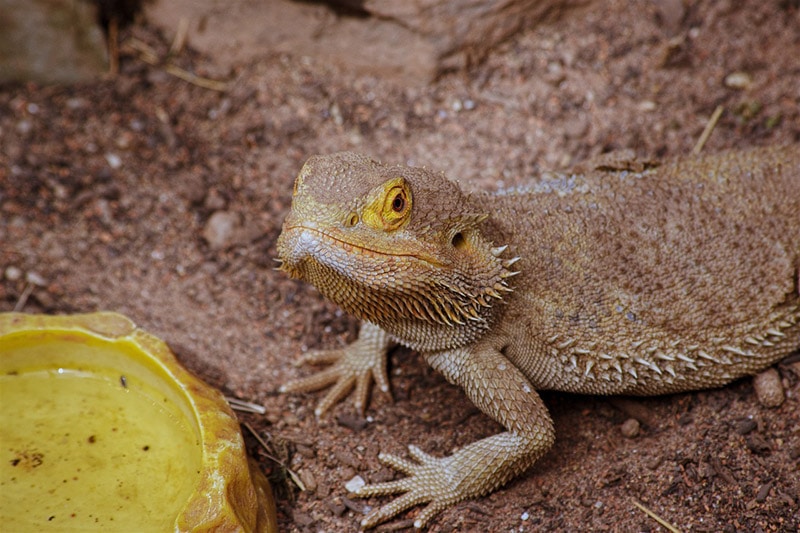
2. Fruits
Bearded Dragons often love fruits, but they should only be given in moderation. They have a high sugar content, which isn’t healthy for Bearded Dragons when fed high amounts.
- Papaya: Besides potassium and fiber, papaya is a good source of vitamins A and C.
- Mango: Mango is an excellent source of fiber, vitamins A and C, and other nutrients.
- Berries: A good source of antioxidants and other nutrients. Examples include blueberries, raspberries, and strawberries.
- Apples: Apples are a wonderful source of fiber and vitamin C, but because they contain a lot of sugar, they should only be used in moderation.
- Melons: Melons, such as cantaloupe and honeydew, are a wonderful source of potassium, fiber, and vitamins A and C.
Ensure that fruits are cut or sliced into manageable bits for your Bearded Dragon to eat before giving them to your pet. Fruits with a lot of acids, like citrus fruits, should also be avoided because they can upset your Dragon’s digestive system.
Ensure any fruits you provide are fresh and untreated with pesticides or other contaminants. Fruits, as with all foods, should be consumed in moderation to prevent overeating and related health issues.
3. Vegetables
On top of insects, Bearded Dragons must also consume veggies for added nutrients. You can often feed your Bearded Dragon whatever veggies you commonly have in your home that are safe for your Bearded Dragon. Of course, some vegetables are better than others.
- Dark, leafy greens: A Bearded Dragon’s diet should include dark, leafy greens. They contain significant amounts of vitamins and minerals, including calcium, which is crucial for healthy bones. Bearded Dragons may consume a variety of dark, leafy greens, such as kale, collard greens, mustard greens, turnip greens, bok choy, and dandelion greens.
- Squash: Squash can be a healthy supplement to a Bearded Dragon’s diet because it is an excellent source of vitamins and fiber. Butternut squash, acorn squash, and spaghetti squash are a few varieties of squash that Bearded Dragons can eat.
- Carrots: Beta-carotene and other vitamins are abundant in carrots. They are heavy in sugar, so they should be consumed in moderation.
- Sweet potatoes: Sweet potatoes are an excellent source of fiber and vitamins. They should also be consumed in moderation due to their high sugar content.
- Bell peppers: Bell peppers contain many vitamins and minerals, including vitamin C. They should only be fed occasionally because they contain a lot of water.
You should vary the veggies that your Bearded Dragon consumes. You don’t want them only to consume a specific vegetable.
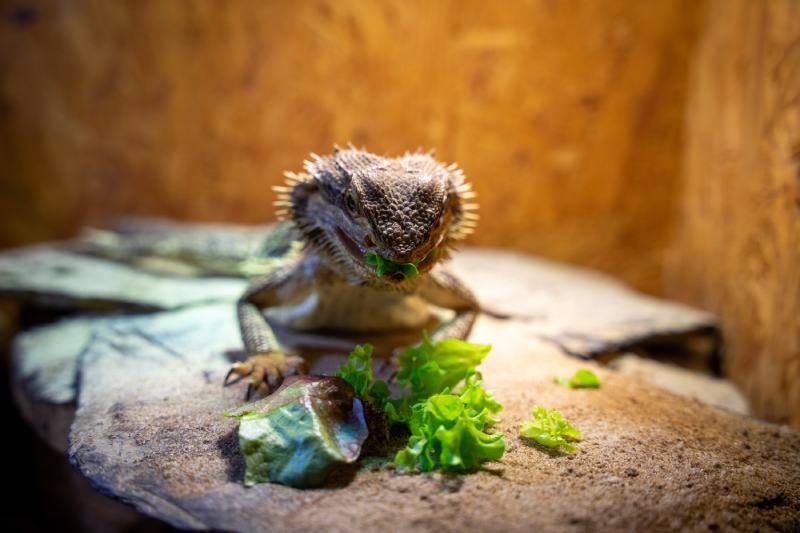
4. Commercial Food
Commercial food is available for Bearded Dragons at many pet stores. However, it is usually recommended that these form part of a varied diet rather than their sole source of nutrition.
- Pellets: Most pet stores have Bearded Dragon pellets designed to give your pet a balanced diet. Pellets can be an excellent choice for Bearded Dragons that are picky eaters or who require a more practical feeding alternative. It’s crucial to remember that not all pellet brands are made equal and that some might not offer enough nourishment. Seek pellets that are low in fat, high in protein, and high in fiber.
- Fresh food mixes: These are prepared especially for Bearded Dragons and are available at some pet stores. These mixtures typically contain a variety of fruits and vegetables in addition to certain protein-rich ingredients like mealworms or crickets. While these mixtures may be a convenient choice, it’s crucial to carefully review the contents to ensure your pet receives a balanced and wholesome diet.
- Insects that have been frozen and dried: Your Bearded Dragon can get a lot of protein from insects like grasshoppers, mealworms, and crickets that have been frozen and dried. Although they are practical and have a long shelf life, live insects may provide a higher level of nutrition. If you decide to feed your pet freeze-dried insects, rehydrate them first.
Commercial foods can provide extra nutrients your pet may have difficulty getting otherwise. However, they can become obese or develop other health problems.
Conclusion
Bearded Dragons can consume various fruits, veggies, and insects. Having an appropriate mix for your lizard’s health and age is vital. Growing Bearded Dragons need a different diet than older Beardies. You will need to shift your Dragon’s diet significantly as they age.
In the end, it’s mostly about variety. You don’t want to feed your Bearded Dragon too much of one thing, as this can lead to deficiencies. Providing a range of different insects and veggies is recommended. Both fruits and commercial diets should only be fed in moderation.
See Also:
- Can Bearded Dragons Eat Meat?
- Can Bearded Dragons Eat Aloe? Vet-Reviewed Nutrition Facts
- Can Bearded Dragons Eat Isopods? Vet-Approved Nutrition Guidelines
Featured Image Credit: Opayaza12, Shutterstock



